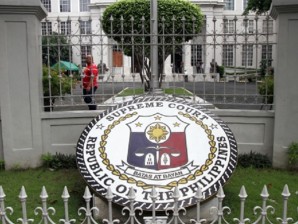SC asked to declare libel provisions in penal code unconstitutional
MANILA, Philippines—Anti-cybercrime law advocates asked the Supreme Court Wednesday to declare as unconstitutional all five libel provisions under the Revised Penal Code.
In a 52-page amended petition by a group of journalists together with lawyers Harry Roque, Romel Bagares and Gilbert Andres asked the high court to nullify Articles 353, 354, 355, 361 and 362 of the Revised Penal Code.
Article 353 defines libel while Articles 354 and 355 enumerates the requirements for publicity and other ways to commit libel aside from writing.
Articles 361 and 362 are about the proof of truth for someone accused of libel and making libelous remarks.
Petitioners told the high court that the five libel provisions should be nullified when it rules on the legality of online libel under Republic Act 10175 or the Cybercrime Prevention Act of 2012.
Petitioners said the United Nations Human Rights Committee involving libel case against their co-petitioner Alexander Adonis held that criminal libel in the revised penal code is incompatible with freedom of expression.
“Articles 353, 354, 355, 361 and 362 of the Revised Penal Code are unconstitutional as these stifle freedom of expression and any prosecution for libel under the Revised Penal code or under RA 10175 which incorporates the said articles by reference or by implication is a continuing violation of Philippine State obligations under the international covenant on Civil and Political rights (ICCPR)as the United Nations Human Rights Committee has so held in its view on Adonis v. Republic of the Philippines where the Committee stated that criminal libel in the Revised Penal Code is incompatible with freedom of expression,” the petitioners said.
“Further, the UNHRC view expressed that the Philippines is ‘also under an obligation to take steps to prevent similar violations occurring in the future,” they added.
Petitioners filed the amended petition after the issue on the legality of ordinary libel came out during the high court’s oral argument last Jan. 15.
At the oral argument, the petitioners argued that the high court already issued several rulings that declared libel as unconstitutional.
Senior Associate Justice Antonio Carpio himself said that the RPC provision must now be unconstitutional and contradicts the court’s free speech rules.
Carpio said when the framers adopted libel in the 1935 Constitution, “they do not have in mind freedom of expression.”
But the high court, in recent rulings adopted the US case New York Times v. Sullivan “and basically, for public officers, there must be actual malice. Second that truth is a defense for public officers and you can always have fair comment on acts of public officers.”
However, Carpio said Article 354 of the RPC said malice is presumed and punishable even if the libelous statement is true.
“We have several cases adopting Sullivan. Even if it is malicious but true, then we reverse conviction,” Carpio said.
Petitioners said the five provisions of the Penal Code while only require “malice” for libel conviction, there are stringent requirements for libel defense.
“Therefore, the libel provisions in the RPC are unconstitutional, for infringing on the constitutional right to freedom of expression and for contradicting jurisprudence established by the Honorable court…Moreover, it is clear that any discussion on the constitutionality of the libel provisions in the Cybercrime Prevention Act cannot be divorced from a serious consideration of the aforementioned libel provisions in the RPC which are referred to in the former directly or by implication,” the amended petition stated.
